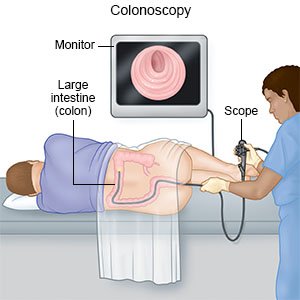Colonoscopy
Medically reviewed by Drugs.com. Last updated on Apr 6, 2025.
A colonoscopy is a procedure to examine the inside of your colon (intestine) with a scope. Polyps or tissue growths may have been removed during your colonoscopy. It is normal to feel bloated and to have some abdominal discomfort. You should be passing gas. If you have hemorrhoids or you had polyps removed, you may have a small amount of bleeding.
 |
DISCHARGE INSTRUCTIONS:
Seek care immediately if:
- You have a large amount of bright red blood in your bowel movements.
- Your abdomen is hard and firm and you have severe pain.
- You have sudden trouble breathing.
Call your doctor if:
- You develop a rash or hives.
- You have a fever within 24 hours of your procedure.
- You have nausea and vomiting.
- You feel anesthesia effects greater than 24 hours.
- You have not had a bowel movement for 3 days after your procedure.
- You have questions or concerns about your condition or care.
Drugs used to treat this and similar conditions
Trulance
Trulance (plecanatide) is used to treat chronic idiopathic constipation (CIC) and irritable bowel ...
Anusol-HC Suppositories
Anusol-HC Suppositories is used for anal itching, hemorrhoids, proctitis, pruritus
Omvoh
Omvoh is used to treat moderate to severe ulcerative colitis or Crohn's disease in adults. This ...
MiraLAX
MiraLAX (polyethylene glycol) is used as a laxative to treat occasional constipation or irregular ...
Lialda
Lialda (mesalamine) is used to treat ulcerative colitis, proctitis and proctosigmoiditis. Includes ...
Motegrity
Motegrity (prucalopride) is used to treat chronic idiopathic constipation. Motegrity information ...
Humira
Humira is a tumor necrosis factor blocker that is used to treat many inflammatory conditions such ...
Prednisone
Prednisone is used to treat allergic disorders, ulcerative colitis, psoriasis and arthritis. Learn ...
Vasopressin
Vasopressin systemic is used for abdominal distension prior to abdominal x-ray, abdominal ...
Gabapentin
Gabapentin is an anti-epileptic drug, also called an anticonvulsant. It is used to treat some types ...
After your colonoscopy:
- Do not lift, strain, or run until your healthcare provider says it is okay.
- Rest as much as possible. You have been given medicine to relax you. Do not drive or make important decisions for at least 24 hours. Return to your normal activity as directed.
- Relieve gas and discomfort from bloating by lying on your left side with a heating pad on your abdomen. You may need to take short walks to help the gas move out. Eat small meals until bloating is relieved.
If you had polyps removed:
Do not take aspirin for 7 days after your procedure, or as directed.
Help prevent constipation:
- Eat a variety of healthy foods. Healthy foods include fruit, vegetables, whole-grain breads, low-fat dairy products, beans, lean meat, and fish. Ask if you need to be on a special diet. Your healthcare provider may recommend that you eat high-fiber foods such as cooked beans. Fiber helps you have regular bowel movements.
- Drink liquids as directed. Adults should drink between 9 and 13 eight-ounce cups of liquid every day. Ask what amount is best for you. For most people, good liquids to drink are water, juice, and milk.
- Exercise as directed. Talk to your healthcare provider about the best exercise plan for you. Exercise can help prevent constipation, decrease your blood pressure and improve your health.
Follow up with your doctor as directed:
Write down your questions so you remember to ask them during your visits.
© Copyright Merative 2025 Information is for End User's use only and may not be sold, redistributed or otherwise used for commercial purposes.
The above information is an educational aid only. It is not intended as medical advice for individual conditions or treatments. Talk to your doctor, nurse or pharmacist before following any medical regimen to see if it is safe and effective for you.
Learn more about Colonoscopy
Treatment options
Symptoms and treatments
Further information
Always consult your healthcare provider to ensure the information displayed on this page applies to your personal circumstances.
